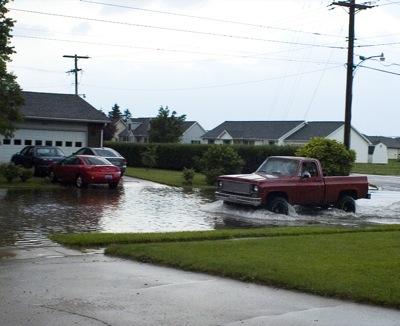Thursday, June 26th, 2008
Contract hog company's closure will affect Grand Lake area farmers
By Nancy Allen
A hog contractor in La Grange, Ind., that provides hogs to a number of contract hog growers in Mercer and Auglaize counties is closing its doors due to high corn prices and the stagnant hog market.
John Van Laere, an attorney for Lambrights Inc., this morning said the 55-year-old company plans to cease operations and is liquidating.
Lambrights has arranged to cover producers' day-to-day feed needs through other local grain elevator sources and is working with the Indiana State Department of Agriculture to work through the situation.
"The state has said they will guarantee that the hogs will be fed and come up with a way to sell or liquidate the hogs," Van Laere said.
Van Laere said he did know how many contract growers there were in Mercer or Auglaize counties. Lambrights owner Dick Lambright would not comment, referring all questions to Van Laere.
Through interviews with local hog farmers, The Daily Standard learned there are at least a half dozen.
Coldwater area farmer Jim Kahlig and his brother raise hogs for Lambrights. Kahlig said the Indiana Department of Agriculture has made arrangements for his hogs to get fed through Cooper Farms and Coldwater Grain.
He said he was surprised when he heard the company was closing and said it is all due to high corn prices and hog prices that haven't kept up.
"It's a mess, that's all I know," said Kahlig, who got into hogs with Lambrights eight years ago. "Hog prices had been climbing, but not as fast as corn has."
Contract livestock companies provide the animals and necessary feed to a farmer, and the farmers put up the building, which is about $480,000 for a 2,000-head hog building, Kahlig said. The company then pays the farmer a per head rent to raise the animal, and the profit from slaughtering goes to the company that owns the animals.
For a farmer whose only income source is contract hogs, this could be devastating. Kahlig said thankfully he also is involved in grain farming, raising steers and has a manure business.
Kahlig's cousin, Fred, also raises Lambrights hogs at his Coldwater area farm.
"It's bad. I ain't gonna be able to raise hogs or steers," Fred Kahlig said Wednesday. "Why should I feed them $7 corn and sell them for nothing. It's not worth it."
Van Laere said most hog farmers are losing about $50 per head due to the high cost of feed and stagnant hog prices.
Fred Kahlig said he too has been getting feed for the animals and has his own grain that he could grind to feed them if he had to.
Various agriculture experts have been predicting for the past year or more that the growing corn ethanol industry would result in problems for poultry and hog farmers. Most agree that corn demand for ethanol plants and a higher demand for commodities such as corn has resulted in rising corn prices and higher feed costs for livestock farmers.

